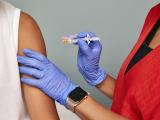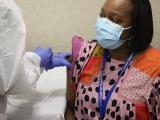Feb 4, 2010 (CIDRAP News) – One third of US adults aged 65 and older are not vaccinated against pneumonia, according to a national report that describes them as representative of millions of adult Americans who are vulnerable to diseases that can be forestalled by vaccines.
And rates of coverage for other vaccine-preventable diseases are much lower: 97% of eligible US adults have not been immunized against tetanus, diphtheria, and pertussis; 90% of eligible adult women are not vaccinated against the virus that causes cervical cancer; and 64% of all adults are not vaccinated against seasonal flu. As a result, according to the report, 40,000 to 50,000 Americans die from vaccine-preventable diseases each year, and $10 billion in healthcare costs is spent unnecessarily.
The report, "Adult Immunization: Shots to Save Lives," was released online today by the Trust for America's Health (TFAH), the Infectious Diseases Society of America (IDSA), and the Robert Wood Johnson Foundation (RWJF). It was supported by a grant from RWJF.
It includes a state-by-state breakdown of rates of immunization against pneumococcal disease among residents aged 65 or older, a group for whom the Centers for Disease Control and Prevention (CDC) recommends the vaccine. In the state with the best record, Oregon, 26.8% of seniors were not vaccinated. The area with the worst record was Washington, DC, where 45.6% were not vaccinated. (The rates were drawn from data gathered by the CDC's Behavioral Risk Factor Surveillance System between 2006 and 2008.)
"Thousands of lives could be saved each year if we could increase the number of adults who receive routine and recommended vaccinations," Jeffrey Levi, PhD, TFAH's executive director, said today during a press briefing on the report's release. "We need a national strategy to make vaccines a regular part of medical care and to educate Americans about the effectiveness and safety of vaccines."
Adult vaccination rates are so poor, leaders of the report's sponsoring organizations and a representative of the American Medical Association said during the briefing, because the United States lacks any infrastructure to support and promote adult immunization. Ironically, they said, an excellent vaccine-promotion system does exist in the country, and has vastly improved vaccination rates—but only among children, who are required to get certain vaccines before being admitted to school.
"It's really time to build a better strategic approach for systematically immunizing adults," said Dr. William Schaffner, chair of preventive medicine at Vanderbilt University and also of the IDSA's Immunization Work Group. "This country has an absolutely stunningly first-rate system for immunizing children, but too many adults still fall through the cracks."
There are multiple barriers to systematically immunizing adults, the report says.
Most US adults do not live or work within a structure that can track and insist on vaccinations in the way school systems do for children. Most insurance plans, including Medicare Part B, do not cover immunizations or other preventive care; many Americans may not be able to afford the resulting co-payments.
And many adults do not have primary care physicians, but rotate for care among a cast of specialists such as cardiologists or orthopedists, who are not set up to provide vaccines and may not even know their patients need them.
To close the gap in adult immunization, the report makes a number of policy prescriptions:
- Private insurance and Medicare should be required to cover any vaccinations recommended by the CDC's Advisory Committee on Immunization Practices, which for adults include chickenpox, diphtheria, hepatitis A and B, human papillomavirus (which can cause cervical cancer), influenza, measles, meningococcal disease, mumps, pertussis, pneumococcal disease, rubella, shingles, and tetanus.
- Congress should create a "Vaccines for Uninsured Adults" program, analogous to the existing Vaccines for Children program, to cover those without insurance.
- Primary and specialty physicians should be encouraged to take vaccination histories from all patients and to offer immunizations at appointments or maintain standing orders for them.
- Health professionals should be role models for acceptance of vaccine by getting immunized themselves, particularly with flu vaccine, for which uptake is particularly low.
- Adoption of interoperable electronic healthcare records that can make a patient's immunization history available to any health provider should be encouraged.
See also:
Page with links to Feb 4 TFAH press release and report
http://healthyamericans.org/report/73/adult-immunization-2010


















